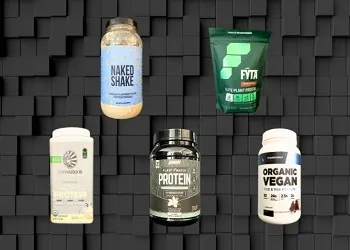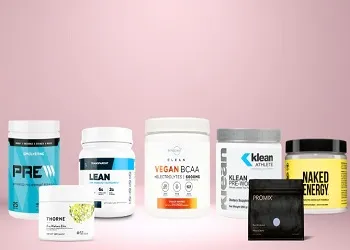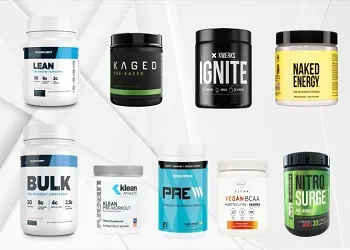Creatine is a popular supplement among athletes that is not considered a banned substance by the World Anti-Doping Agency (WADA) or any other governing body for UFC, meaning UFC fighters can take creatine. For combat athletes, creatine supplementation can increase strength, boost anaerobic power, and accelerate recovery.
Quick Look
- Creatine is an amino acid derivative naturally produced in the body and found in the highest concentrations in muscle tissue.
- Research shows significant benefits for muscle strength, anaerobic power, and recovery with creatine supplementation.
- Creatine is not tested for or banned by the anti-doping agencies governing the UFC.
- Doses of creatine vary depending on whether you are following a loading protocol (20 g/day for 5-7 days) or a maintenance protocol (5 g/day for 28 days).
Table of Contents
What Is Creatine?

Creatine is a substance naturally produced in the body and found in high concentrations in muscle cells. It is an energy substrate, especially during high-intensity or rigorous activity, such as heavy weight lifting.
De novo, creatine is synthesized from three amino acids via a two-step reaction:
- Arginine
- Glycine
- Methionine
Unlike many substances, creatine can cross the blood-brain barrier but can also be synthesized endogenously by neurons.
The primary function of creatine is to supply energy to tissues with high energy demands, such as the brain and muscles. This is done through phosphocreatine’s high-energy phosphate bonds that can immediately replenish ATP stores during energy-demanding circumstances.
Some of the potential ergogenic benefits of creatine monohydrate supplementation include:
- Improved force output
- Augmented power output
- Increased strength
- Higher anaerobic threshold
- Better work capacity
- Enhanced recovery
- Enhanced training adaptations
Studies also suggest that creatine could improve anaerobic exercise performance by increasing time to exhaustion and enhancing glycogen storage.
Key takeaway: Creatine is an amino acid derivative found in high concentrations in muscle tissue. It serves as an energy substrate during high-intensity, vigorous activity and shows benefits for improving various aspects of exercise performance.
Creatine and Sports Performance
Since the 1990s, creatine monohydrate has emerged as one of the best ergogenic supplements on the market. Whether you’re a powerlifter, runner, or just a casual gym junkie, a plethora of studies support the use of creatine for several aspects of sports performance, ranging from muscle growth and recovery to sprint performance and power output.
But how can it do this?
Supplementation with exogenous creatine can increase the pool of intracellular creatine, amplifying the cell’s ability to resynthesize ATP, the body’s primary energy source. By boosting intracellular creatine levels, it can lead to increases in:
- Maximal strength (low-speed strength)
- Maximal work output
- Power production (high-speed strength)
- Sprint performance
- Fat-free mass
How Does Creatine Work?
Creatine enters muscle cells, readily combining with phosphate to form creatine phosphate, a high-energy phosphagen stored in the ATP-CP system. The ATP-CP energy system is essential for rapid energy production during speed and power exercises.

Simply put, when muscles start to run low on energy (ATP), the enzyme creatine kinase (CK) transfers a phosphate group from creatine phosphate to ADP to produce ATP—but this can only happen if sufficient amounts of phosphocreatine are present. In doing so, the muscle will work anaerobically (without oxygen) until creatine phosphate supply runs low.
Combat Sports Athletes and Creatine Supplementation
So, should combat fighters take creatine?
For the average athlete, creatine offers a handful of benefits that can maximize the results you see from training. For combat athletes who typically have different goals than lifters, creatine supplementation provides several advantages.
- Increase strength
Fighting—Muay Thai, boxing, jiu-jitsu, judo, etc.—don’t focus on strength as much as they do speed and skill, but that doesn’t mean strength is important for performance.
Weightlifting is a key component of training for fights, and one study found that people who combine weight work with creatine supplementation see an average of 8% greater strength gains than people lifting without creatine. It also led to 14% more reps performed at a given load.

Progressive overload is an important part of strength and muscle gains, and creatine supplementation may enhance work capacity, thereby augmenting muscle and strength gains.
But the reason why creatine is effective for strength and muscle growth is that to replenish ADP back to ATP rapidly, the body uses stored phosphocreatine (PCr). With more energy, the body can complete more reps, causing more damage and, ultimately, more muscle growth.
A 2000 study published in Medicine & Science in Sports & Exercise investigated the effects of 6 weeks of oral creatine supplementation during a periodized program of arm flexor strength training on arm flexor 1RM, upper arm muscle area, and body composition. They found that creatine supplementation resulted in a 15% increase in weight (11 lbs/5 kg) for a 1RM bicep curl. Researchers concluded that taking creatine led to greater increases in arm flexor muscular strength, upper arm muscle area, and fat-free mass than strength training alone.
Another study found that creatine supplementation increased maximum squat and bench press strength but led to a 20% increase in testosterone levels compared with only 5% in the placebo group.
Key takeaway: Most studies on creatine and strength suggest that creatine supplementation can improve strength and exercise repetitions for various exercises in trained and untrained individuals.
- Improve anaerobic power
Anaerobic exercise is any exercise that involves short, fast, high-intensity movements that don’t require oxygen. Instead, anaerobic exercise breaks down intramuscular glucose (or carbs and fat) for energy.
Wrestling, boxing, MMA, judo, and others are grueling sports that push an athlete’s body and test virtually every muscle and energy system. However, some research suggests that, during fighting, the system most heavily taxed is the anaerobic or lactate system.
But depending on the sport, different energy systems are used:
- Oxidative contribution in striking combat sports varied from 62% in karate and taekwondo to 86% in boxing.
- ATP-PCr system contributed 10% in boxing to 31% in taekwondo, and glycolytic contribution ranged from 3% in taekwondo (3rd round) and 21% in karate.
- Oxidative contribution in a 4-minute judo match was 79%, followed by 14% ATP-PCr system contribution and 7% glycolytic system contribution.
Although combat sports are powered mainly by the oxidative system, this research suggests the scoring actions are likely supported by the anaerobic pathways.
As such, training anaerobic power is essential.
A 2019 study published in Nutrients found that creatine supplementation improves anaerobic power in a 30-second all-out cycling sprint test. Taking creatine could help you sustain high-intensity exercise for longer.
The suggested doses of creatine are as follows:
- Loading phase: 20⁻30 g/day (divided 3-4 times/day) for 6-7 days
- Maintenance phase: 5 g/day for nine weeks OR 3 mg/kg/day for 14 days
Another study published in the International Journal of Sport Nutrition and Exercise Metabolism found that a 4-day creatine load (20g – 5g 3x/day) led to a 3.7% improvement in cycling power.
Key takeaway: Creatine loading followed by a maintenance phase benefits high-intensity anaerobic activity and may improve performance in combat fighters.
- Accelerate recovery
Regardless of which combat sport you’re in, a speedy recovery between rounds is important; you want to finish how you started—strong.
Few supplements can replenish energy stores between bouts of high-intensity activity like creatine. As such, taking creatine may help reduce feelings of fatigue and accelerate recovery.
As mentioned previously, creatine supplementation is an effective method to increase intramuscular PCr concentrations by up to 40%, which is a key component of the ATP-PCr energy system; the ATP-PC system is responsible for producing the majority of ATP during high-intensity bouts of activity lasting 0–30 seconds.
It’s suggested that improved physical performance results from a higher initial intramuscular PCr concentration at the start of the exercise and enhanced PCr resynthesis during recovery periods. Based on this, PCr availability increases throughout the successive bouts, which functions to attenuate decreases in power output and fatigue.
To add to that, activity characterized by a high force output (almost every combat sport) relies more heavily on type II muscle fibers, which have a higher PCr content than the more oxidative type I fibers; type II fibers are favored during near or maximal effort activities using a high degree of force output.
Key takeaway: Creatine supplementation may enhance PCr resynthesis during recovery periods, which can maintain (or improve) force production and power output during combat sports.
Can UFC Fighters Take Creatine?
When USADA became the UFC’s official anti-doping agency in 2015, supplements that were previously allowed became banned overnight.
But what about creatine?
Creatine is not screened for or banned by the World Anti-Doping Agency (WADA), the International Olympic Committee (IOC), or the NCAA, making it entirely legal for UFC fights to use.
The biggest issue with creatine supplementation for fights is water retention.
Creatine is an osmotically active substance, meaning that when creatine concentration increases, it draws water into cells via sodium-dependent creatine transporter. As such, loading up on creatine in an effort to see performance results could lead to increased water retention and higher body weight.
Weigh-ins are one of the most critical points for a UFC fighter; if you don’t make weight, you can’t fight. And when half a pound can be the difference between getting into the Octagon or sitting on the sidelines, you don’t want a supplement messing up your odds.
So, while creatine supplementation wasn’t prohibited under USADA’s ruleset and still isn’t under the Drug Free Sport International, many combat athletes choose to forego creatine supplementation due to its side effects.
That said, it’s important to note that studies aren’t consistent with whether creatine supplementation increases long-term water retention. However, it does appear to increase total body water content acutely, especially during creatine loading (>20 g/day).
But for athletes who choose to take creatine, scheduling supplementation (i.e., stopping it weeks before a fight) can offer several benefits for fight performance.
Creatine Recommended Dose for Combat Athletes
How much creatine you take will dictate how fast you maximize stores. There are two methods for taking creatine:
- Loading strategy: 20 g/day for 5-7 days to maximize muscle saturation, followed by 2-5 g/day to maintain muscle levels
- Non-loading strategy: 3-5 g/day daily (it can take up to 28 days to maximize muscle creatine saturation)

Although creatine loading can increase stores faster than a maintenance dose, the difference between completing a loading phase or following a low-dose protocol will be negligible after about a month.
When Should You Take Creatine for MMA?
Unlike some supplements that offer maximum benefits when taken at certain times, there’s little evidence to suggest taking creatine at a specific time is more beneficial than another.
However, some studies suggest that taking creatine post-exercise may benefit muscle growth but not strength.
One of the most important factors when considering creatine consumption timing is how long it takes for creatine concentrations to increase in the bloodstream.
Creatine monohydrate absorption has an absorption rate close to 100%, and after 2 g of creatine ingestion, it reaches peak plasma concentration in about 1 hour. Other studies show similar results—maximum plasma creatine concentration is reached in less than 2 hours with doses under 10 g.
Higher doses (>10 g) can take up to 2.5 hours to reach peak plasma concentrations, but average doses of 5 g should take between 1-2 hours and remain elevated for another four.
Long story short, the timing of creatine intake isn’t as important as how much you’re taking and if you’re consistent with consumption.
A study published in the Journal of the International Society of Sports Nutrition found no significant difference in muscle creatine uptake if consumed at different times of the day. This means that you can take creatine whenever it best works for you. That said, pairing creatine with carbs can increase muscle creatine uptake and mitigate any GI side effects.
Side Effects and Interactions of Taking Creatine
As with any dietary supplement, knowing the side effects and possible interactions is important before taking any new supplements.
Although not common with creatine, side effects include:

People with kidney disease, high blood pressure, or liver disease should avoid taking creatine supplements.
Possible Interactions
If you’re currently taking any of the following medications, consult with your doctor before taking creatine:
- Nonsteroidal anti-inflammatory drugs (NSAIDs)
- Caffeine
- Diuretics
- Cimetidine (Tagamet)
- Drugs that affect the kidneys
- Probenecid
Frequently Asked Questions
Should boxers take creatine?
Creatine is most well-known for improving strength, but boxers can benefit from taking creatine, too. Research shows creatine supplementation can enhance strength endurance, along with anaerobic power. When muscles break down glucose for energy, the muscle becomes more acidic. Phosphocreatine buffers hydrogen ions that cause acidification of muscles during high-intensity anaerobic exercise that would otherwise inhibit the muscles’ ability to contract. As such, creatine can help delay time to exhaustion, enabling boxers to produce more power for longer during high-intensity bursts.
Do MMA fighters take creatine?
Creatine for MMA fights can offer many benefits, including improving strength, anaerobic capacity, and muscle density. In short, creatine supplementation can help you train harder and longer but may also improve recovery between bouts of activity and facilitate enhanced muscle recovery post-exercise.
Are UFC fighters allowed to take supplements?
UFC fighters can take dietary supplements if they comply with Drug Free Sport International regulations. UFC athletes trust the Banned Substances Control Group (BSCG) to ensure they choose supplements free of prohibited substances and meet quality expectations.
Do MMA fighters need creatine?
Combat athletes don’t need any supplements to achieve maximum athletic performance, but supplements like creatine can improve strength and endurance and enhance recovery to help athletes perform at their peak.














